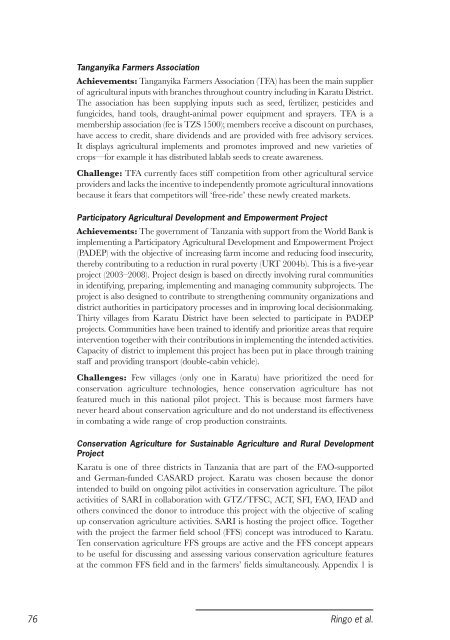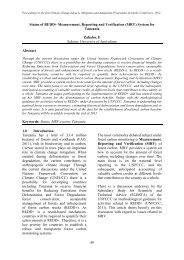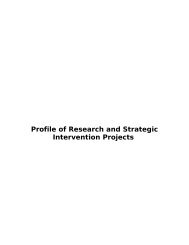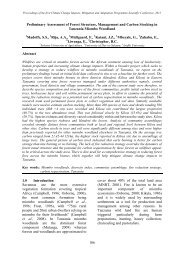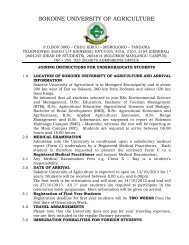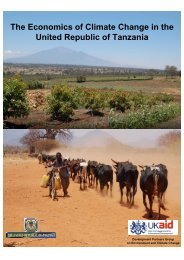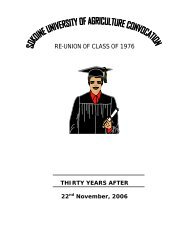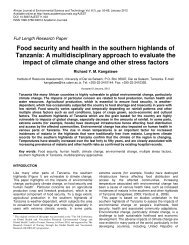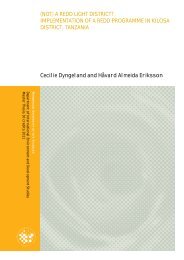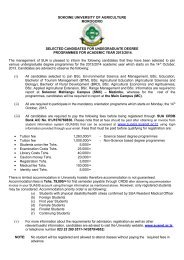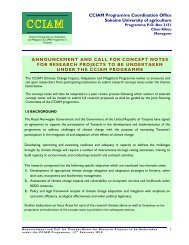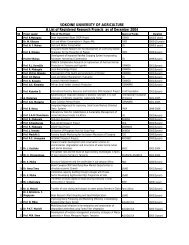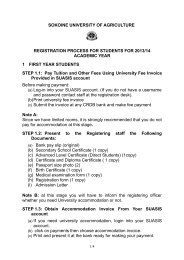Conservation agriculture Tanzania_casestudy.pdf - Sokoine ...
Conservation agriculture Tanzania_casestudy.pdf - Sokoine ...
Conservation agriculture Tanzania_casestudy.pdf - Sokoine ...
- No tags were found...
Create successful ePaper yourself
Turn your PDF publications into a flip-book with our unique Google optimized e-Paper software.
Tanganyika Farmers AssociationAchievements: Tanganyika Farmers Association (TFA) has been the main supplierof agricultural inputs with branches throughout country including in Karatu District.The association has been supplying inputs such as seed, fertilizer, pesticides andfungicides, hand tools, draught-animal power equipment and sprayers. TFA is amembership association (fee is TZS 1500); members receive a discount on purchases,have access to credit, share dividends and are provided with free advisory services.It displays agricultural implements and promotes improved and new varieties ofcrops—for example it has distributed lablab seeds to create awareness.Challenge: TFA currently faces stiff competition from other agricultural serviceproviders and lacks the incentive to independently promote agricultural innovationsbecause it fears that competitors will ‘free-ride’ these newly created markets.Participatory Agricultural Development and Empowerment ProjectAchievements: The government of <strong>Tanzania</strong> with support from the World Bank isimplementing a Participatory Agricultural Development and Empowerment Project(PADEP) with the objective of increasing farm income and reducing food insecurity,thereby contributing to a reduction in rural poverty (URT 2004b). This is a five-yearproject (2003–2008). Project design is based on directly involving rural communitiesin identifying, preparing, implementing and managing community subprojects. Theproject is also designed to contribute to strengthening community organizations anddistrict authorities in participatory processes and in improving local decisionmaking.Thirty villages from Karatu District have been selected to participate in PADEPprojects. Communities have been trained to identify and prioritize areas that requireintervention together with their contributions in implementing the intended activities.Capacity of district to implement this project has been put in place through trainingstaff and providing transport (double-cabin vehicle).Challenges: Few villages (only one in Karatu) have prioritized the need forconservation <strong>agriculture</strong> technologies, hence conservation <strong>agriculture</strong> has notfeatured much in this national pilot project. This is because most farmers havenever heard about conservation <strong>agriculture</strong> and do not understand its effectivenessin combating a wide range of crop production constraints.<strong>Conservation</strong> Agriculture for Sustainable Agriculture and Rural DevelopmentProjectKaratu is one of three districts in <strong>Tanzania</strong> that are part of the FAO-supportedand German-funded CASARD project. Karatu was chosen because the donorintended to build on ongoing pilot activities in conservation <strong>agriculture</strong>. The pilotactivities of SARI in collaboration with GTZ/TFSC, ACT, SFI, FAO, IFAD andothers convinced the donor to introduce this project with the objective of scalingup conservation <strong>agriculture</strong> activities. SARI is hosting the project office. Togetherwith the project the farmer field school (FFS) concept was introduced to Karatu.Ten conservation <strong>agriculture</strong> FFS groups are active and the FFS concept appearsto be useful for discussing and assessing various conservation <strong>agriculture</strong> featuresat the common FFS field and in the farmers’ fields simultaneously. Appendix 1 is76 Ringo et al.


